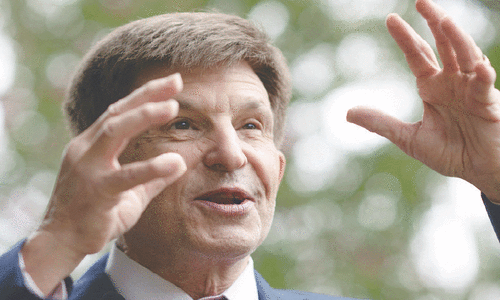KIGALI: Rwanda’s all-powerful President Paul Kagame was sworn in on Sunday for a fourth term, saying regional peace was a “priority” in the face of ongoing conflict in the neighbouring Democratic Republic of Congo.
Kagame swept to victory in elections last month with a staggering 99.18 per cent of the vote, giving him another five years in office.
Several dozen heads of state and other dignitaries from African nations joined the inauguration ceremony at a packed 45,000-seat stadium in Kigali, where many were dressed in the green, yellow and blue colours of the Rwandan national flag.
The outcome of the July 15 poll was never in doubt for the iron-fisted Kagame, who has ruled the small African nation since the 1994 genocide, as de facto leader and then president.
Rights activists said the 66-year-old’s overwhelming victory was a stark reminder of the oppressive regime in Rwanda, with only two candidates authorised to run against him and several prominent critics barred.
Kigali is also accused of stoking instability in the mineral-rich east of the DRC, its much larger neighbour, by backing M23 rebels fighting Kinshasa’s armed forces. “Peace in our region is a priority for Rwanda yet it has been lacking, particularly in eastern DRC,” Kagame said in his inauguration address.
“But peace cannot be delivered by anyone or from anywhere no matter how powerful if the party most concerned does not do what is needed,” he said in an apparent barb targeting Kinshasa.
Angola’s President Joao Lourenco, among those who attended Sunday’s ceremony, was due to have private talks with Kagame on a DRC ceasefire deal hammered out last month, the Angolan presidency said.
Luanda brokered the agreement after a meeting between the foreign ministers of DRC and Rwanda.
But on August 4, the day the ceasefire was supposed to take effect, M23 rebels — who have seized territory in the east since launching a new offensive at the end of 2021 — captured a town on the border with Uganda.
A recent UN experts report said 3,000-4,000 Rwandan soldiers are fighting alongside M23 and that Kigali had “de facto control” of the group’s operations.
Questioned repeatedly on the issue, Kagame has not explicitly denied the presence of Rwandan forces in DRC, instead pointing to the “persecution” of the Tutsi minority and the risk of instability on Rwanda’s border.
‘Climate of fear’
Kagame is credited with rebuilding a ruined nation after the genocide, when Hutu extremists unleashed 100 days of vicious bloodletting targeting the Tutsi minority, killing around 800,000 people, mainly Tutsis but also Hutu moderates. But rights activists and opponents say he rules in a climate of fear, crushing any dissent with intimidation, arbitrary detentions, killings and enforced disappearances.
With 65pc of the population aged under 30, Kagame is the only leader most Rwandans have ever known. “I proudly cast my vote for president Kagame and made it a priority to be here today to witness this historic inauguration,” said Tania Iriza, a 27-year-old trader, one of the tens of thousands who turned out for the ceremony.
“His leadership has been transformative for our nation. Under his leadership, Rwanda has risen from our tragic past and forged a path towards prosperity, unity and innovation.” Kagame has won every presidential election he has contested, each time with more than 93pc of the ballot.
In 2015, he oversaw controversial constitutional amendments that shortened presidential terms to five years from seven but reset the clock for the Rwandan leader, allowing him to potentially rule until 2034.
Published in Dawn, August 12th, 2024














































Dear visitor, the comments section is undergoing an overhaul and will return soon.